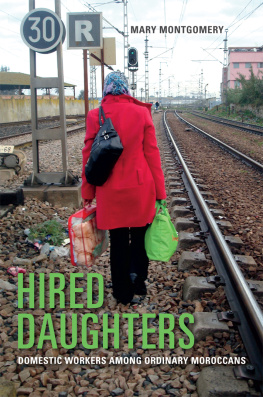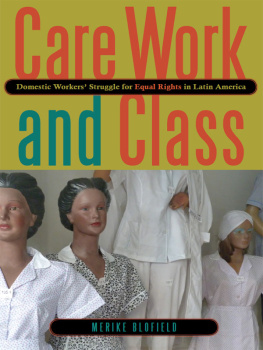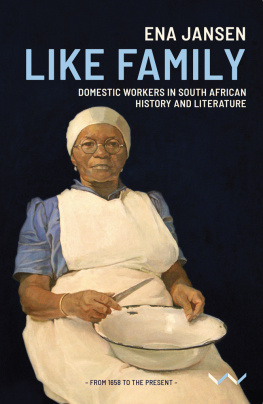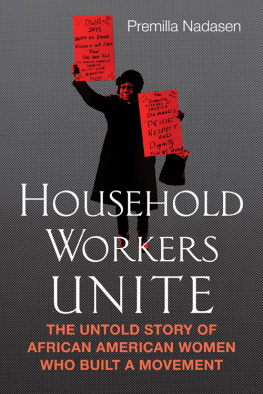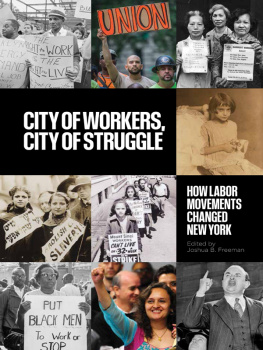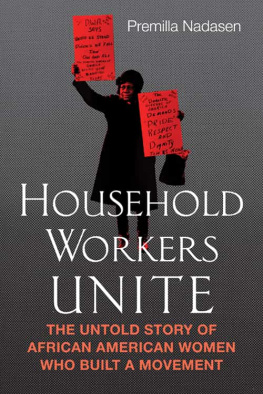



Copyright 2014 by Sheila Bapat.
All rights reserved.
First Paperback Edition
10 9 8 7 6 5 4 3 2 1
No part of this book may be used or reproduced in any manner without written permission of the publisher.
Please direct inquiries to:
Ig Publishing, Inc
392 Clinton Avenue
Brooklyn, New York 11238
www.igpub.com
Library of Congress Cataloging-in-Publication Data
Bapat, Sheila, 1981-
Part of the family? : nannies, housekeepers, caregivers and the battle for domestic workers rights / Sheila Bapat.
1 online resource.
Description based on print version record and CIP data provided by publisher; resource not viewed.
ISBN 978-1-935439-88-2 (Ebook)
1. Household employees. 2. Household employees--United States. 3. Household employees--Legal status, laws, etc. 4. Migrant labor--Legal status, laws, etc. 5. Household employees--Labor unions. 6. Emigration and immigration. I. Title.
HD8039.D5
331.761640973--dc23
2014015421
For my mom, whose hard work made me who I am today.
CONTENTS
A book that tells us the story of domestic workers is a victory in itself, because it gives overdue recognition to a forgotten sector of the labor force. It speaks against the marginalization of those workers and says, Dont forget! As American labor movements have won rights for other workers, domestic employees have historically been left behind. Their work is often devalued as menial. It is work that is unrecognized in the context of families and in the labor market. To win rights for domestic workers means to go up against the triple threat of class, race and gender barriers. To the modern equivalents of the upper crust we see in Downton Abbey, domestic work should be out of sight and out of mind. It is denigrated as the duty (not even real work) of women and is generally the employment realm of immigrants and women of color. We see the extreme form of this dehumanization in a celebrated case in which a diplomat in New York left the country, rather than face accusations that she underpaid and abused a nanny.
When I worked with the National Domestic Workers Alliance to write a Domestic Workers Bill of Rights for California, I knew I was going up against this kind of mindset. Too many people didnt understand why these workers should be brought under the umbrella of worker protections. I took inspiration from the New York version of the Domestic Worker Bill of Rights. We kept on with the valiant support of people like Sen. Kevin de Len, whose mother rode the bus to clean houses when he was a boy, and institutions like the New York Times, which spoke up for these rights.
I knew how underpaid these women are. Many have wages that dont even work out to minimum wage. I was struck to hear that in many of their households, there is not enough money to keep food in the house all month long. They have to come to work sick and dont get time off to see a doctor. Nearly a quarter of them have been fired for calling in sick.
Despite the support, and despite the overwhelming need, our bill faced nasty attacks. It was mischaracterized as a babysitter bill. There were scare tactics aimed at disabled employers of care workers. There was an industry that wanted to maximize profits by keeping pay low. We worked for two years, only to have the bill vetoed at the last minute in 2012. It was a shock to me, and a terrible slap to the workers who advocated to bring the bill to the Governors desk. I immediately committed to coming back with a new bill. The next time around, we prevailed and convinced the Governor to sign a bill for overtime pay, thanks in large part to high-profile women like Amy Poehler and Sandra Fluke, and of course thanks to the hundreds of domestic workers and their employers who worked tirelessly on AB 241. Ours was not the only victory in 2013. We also saw Hawaii enact a bill, and we saw moves at the federal level. New Department of Labor regulations that go into effect in 2015 will bring some relief to domestic workers across the country.
That isnt the end of the story, though. As this book shows, there is still work to be done around the United States, here in California, and throughout the world. But thats what worker struggles are likeyou win the advances a step at a time. Sometimes, you work hard and face obstacles, as we did in 2012. Other states are still at that stage. Sometimes, you manage to make a big step forward. This book is a step forward.
Tom Ammiano, Member of the California State Assembly
Care can never be valued if its givers are exploited.Michael Lyon, San Francisco Gray Panthers and Hand in Hand
Chevy Chase, Maryland, is a charming, upper-crust town of just under one thousand residents. Maple and oak trees line the streets, and houses are worth nearly a million dollars. The median family income is about $140,000 per year. It was here that Fatima Cortessi, at the age of twenty, landed after leaving her home country of Paraguay in 2011.
The deal that brought Fatima to America seemedas it so often does for domestic workerssolid: $1,000 per month to clean, cook, and care for the children of a couple living in the United States. The first few months went smoothly, with Fatima settling into her new country. Though she spoke no English, the couple she was working for promised to help her enroll in English classes and possibly attend college.
Around month four of her new life in the United States, however, things began to fall apart for Fatima. First, the husband, also a native of Paraguay, became emotionally abusive. You wouldnt be here if it wasnt for me. You owe me, he started telling her on a regular basis. In addition, the couple wouldnt always pay her regularly. When she asked for her money, Fatima would receive $100 or $150 at most. Not that Fatima had any time to spend her money, as her days began at six in the morning, when she fed the children and got them ready for school. After the kids left, Fatima would spend the rest of the morning cleaning the house and caring for the family dog. At two oclock, the children would come home from school and Fatima would take care of them, cook for the family in the evening, and then clean up after everyone. If she was lucky, shed be in bed by nine thirty or ten oclock. She slept on a sofa in the basement, which she shared with the dog. And she worked weekends as well.
At some point, the couple Fatima was working for separated and moved into different homes. Fatimas job became twice as hard, as she was now responsible for cleaning both houses, for the same amount of money. Since she had never been taught how to use the local public transit system, she was required to ride a bike from one house to the otherwhile taking the dog with her.
This situation continued for a year and a half, at which point the couple said they could no longer afford to pay Fatima the same amount of money; she was forced to find work cleaning other homes while still working for her original family part-time. Eventually, she shared her story with one of her new employers. They cant do this to you, the woman said, after Fatima revealed the saga of the past eighteen months of her life. The woman told Fatima about Casa de Maryland, an immigrant rights organization. It was there that Fatima met attorney Sheena Wadhawan. And that was when Fatimas life began to change.
Next page

